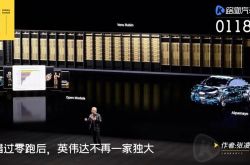Will AI become Baidu's "winning hand" in e-commerce?
![]() 09/14 2024
09/14 2024
![]() 599
599

Source | Bohu Finance (bohuFN)
In 2007, Baidu ventured into e-commerce for the first time by establishing an e-commerce division.
Over a decade later, Zhu Shimao, a prominent comedian, chose Baidu's preferred live streaming room for his debut live streaming sales, achieving a record single-session GMV of over 13 million yuan.
During this over 20-hour live stream, Baidu also showcased its "new muscles" by customizing an AI clone of Zhu Shimao to replace him in the second half, successfully completing the live stream premiere.

From establishing an e-commerce division, building its own e-commerce platform, to creating an aggregated e-commerce platform, and now an AI-powered e-commerce platform, Baidu's "e-commerce dream" continues to evolve.
However, Baidu's early forays into e-commerce remained lukewarm, raising questions about whether its current AI-powered e-commerce strategy can carve out a successful path.
01 Baidu's e-commerce revolution redux
This live stream featured not only Zhu Shimao but also his long-time Spring Festival Gala partner Chen Peisi. Zhu Shimao took on the dual roles of "Knife Brother" and "Chief Price Negotiator" for Baidu Preferred, delivering one hilarious price negotiation performance after another. The live stream was filled with "genuine" deals, earning accolades from netizens.

Special offers included "3 packs for 1 yuan" noodles, Ecuadorian white shrimp priced so low that merchants barely made a profit, and "gravity-defying" Daoxiangcun mooncakes. According to Baidu, the live stream instantly attracted over 2 million viewers, achieving a 6-hour GMV of 13 million yuan.
This "comedy-style price negotiation" live stream hinted at a new direction for Baidu's e-commerce development.
As Baidu's latest e-commerce brand, Baidu Preferred upgraded its value proposition to "Effortless Choice" in May this year, aligning with the "price negotiation" live stream concept. Since its launch last year, Baidu Preferred has emerged as a core member of Baidu's e-commerce ecosystem.
According to official sources, with the upgraded value proposition, Baidu Preferred will leverage AI capabilities to assist users in making efficient pre-purchase decisions, ensuring they purchase high-quality products at competitive prices, and enjoying hassle-free after-sales service throughout their shopping journey.
Baidu's other trump card is its AI-driven e-commerce development, evident in this live stream.
The live stream lasted over 20 hours, making it impractical for the 70-year-old Zhu Shimao to participate throughout. Instead, Baidu customized an AI clone of Zhu Shimao to take over in the second half.
Baidu Preferred has introduced HuiBoxing, the industry's first AI-powered all-in-one digital human live streaming solution. Leveraging generative AI technologies, HuiBoxing enables live streaming to operate "autonomously" through its core capabilities of intelligent presentation, intelligent decision-making, and intelligent scene control.
By May, HuiBoxing had helped tens of thousands of merchants reduce costs and increase efficiency, lowering live streaming operation costs by 80% and boosting average GMV by 62%.
Beyond AI anchors, Baidu Preferred offers intelligent shopping guidance in search scenarios. This includes search-based intelligent shopping guidance and an intelligent shopping assistant, the latter being China's first generative AI shopping assistant, focused on efficient decision-making and precise product-customer matching.
It is evident that Baidu aims to create a more intelligent, shopping-assistant-oriented e-commerce platform.
Looking back over Baidu's decade-long journey in e-commerce, from establishing an e-commerce division, launching its self-operated e-commerce platform "Baidu Youa," creating aggregated platforms like "Dudiaodian" and B2B platform "Aicaigou," to its current AI-powered aggregated e-commerce platform Baidu Preferred.
While Baidu's e-commerce explorations have touched upon various milestones, it has remained relatively understated over the years, ultimately returning to aggregated e-commerce. Why, then, has Baidu bet on AI?
02 Why AI-powered e-commerce?
Firstly, from an external perspective, AI's impact on the e-commerce industry and live streaming is forward-looking.
According to the China Internet Network Information Center's "Statistical Report on the Development of China's Internet," China's online performance (live streaming) market reached 209.5 billion yuan in 2023, a 5.15% increase from 2022. The introduction of AI technologies has further fueled the development of live streaming, reducing costs, enhancing efficiency, and optimizing content production and audience engagement through intelligent analysis and automation tools.
Today, not only Baidu but also Alibaba, JD.com, and Douyin are accelerating their AI-powered e-commerce layouts.
From Baidu's perspective, its past e-commerce experiments have highlighted the incompatibility of self-operated e-commerce with its core competencies. Its initial success with aggregated e-commerce models has led it to adopt a unique AI-powered e-commerce strategy tailored to its strengths.
In its early days, Baidu was focused on self-operated e-commerce, launching platforms like "Baidu Youa," "Rakuten," "Ilehuo," and "Baidu Mall." However, most of these platforms failed within two to three years.
Baidu's true taste of e-commerce success came with the 2019 launch of "Dudiaodian," which connected e-commerce live streaming and self-media creators, opening up monetization channels for Baidu Baijiahao creators. Simultaneously, it partnered with third-party e-commerce platforms like Pinduoduo and JD.com to form aggregated e-commerce entry points.
Another key player is "Aicaigou," Baidu's version of 1688, seamlessly linking high traffic from Baidu search to fulfill users' procurement information retrieval needs.
As of May 2022, Baidu's e-commerce search volume increased by 29.3% year-on-year, and the number of successful paying buyers grew 4.16 times, according to iResearch data.
It is well known that self-operated e-commerce requires not only supply chain development but also self-built logistics, completing the closed-loop construction of people, goods, and places. While Baidu initially had aspirations for self-operated e-commerce, it lacked the commitment to heavy investments, making it difficult to compete with established players like Taobao and JD.com.
The emergence of Dudiaodian and Aicaigou opened monetization channels for Baidu's platform creators and established the first link between traffic and e-commerce. Critically, these light-model products paved a suitable path for Baidu's e-commerce development. However, the rise of Douyin Xiaodian and Kuaishou Xiaodian has left Dudiaodian and Aicaigou relatively understated, necessitating new momentum for Baidu.
Regarding Baidu's e-commerce strategy, Ping Xiaoli, General Manager of Baidu E-commerce, stated in a media interview, "We do not intend to replicate the models of JD.com or Taobao. Instead, we will leverage the powerful Baidu APP, with its core fields of Baidu Search and Baidu Information Feed, to create a unique e-commerce ecosystem."
Baidu Preferred embodies this new outlet, inheriting the aggregated model while infusing AI technology to create Baidu's most distinctive e-commerce ecosystem.

Baidu Preferred integrates products from third-party e-commerce platforms like JD.com, Suning Tesco, and Pinduoduo. In terms of merchant recruitment, it adopts three strategies: origin-based, brand-based, and bulk recruitment.
While vigorously attracting merchants, Baidu Preferred recognizes the importance of retaining users and merchants.
Therefore, on the user side, Baidu Preferred introduces intelligent shopping guidance, while on the merchant side, it launches HuiBoxing, aiming to create an AI-driven, all-in-one intelligent e-commerce platform that integrates search, browsing, and recommendation to attract and retain users and merchants.
According to Baidu, the number of active merchants on Baidu Preferred grew by 309% year-on-year in 2023, with GMV up 594% and the number of live streaming transaction users increasing by 469%. Notably, generative AI contributed 20% of transactions.
As of May this year, Baidu Preferred's GMV grew by 227% year-on-year, with monthly transaction users and active merchants increasing by 283% and 242%, respectively, highlighting the benefits of AI technology for Baidu's e-commerce growth.
Moreover, Baidu's recent strength lies in AI technology, with significant investments in autonomous driving and the thriving Wenxin ERNIE Bot large language model. Now, not only Baidu Preferred but also Baidu Search, Xiaodu Smart Speaker, and Baidu Netdisk have integrated Wenxin ERNIE Bot.
In terms of AI technology application, Baidu is actively exploring new frontiers, not only in e-commerce but also in healthcare and education.
It is evident that AI-powered e-commerce aligns with Baidu's decade-long e-commerce journey and represents a crucial step in the implementation of its AI technologies.
03 New challenges
As user growth plateaus and traffic dividends diminish, China's e-commerce industry has entered an era of Stock competition . Consequently, exploring new growth opportunities has become imperative for e-commerce platforms.
However, as AI technology increasingly integrates into e-commerce operations, it is emerging as the industry's biggest future variable. Industry insiders note that "generative AI is empowering logistics, store opening, product listing, marketing, and other e-commerce aspects, providing new momentum for industry development. The integrated application of AI and e-commerce will become the biggest future trend."
Numerous e-commerce platforms have already ventured into AI-powered e-commerce.
In March, Taobao and Tmall Group launched their self-developed large language model, "Taobao Xingchen," marking the group's first such endeavor. As early as last year, Taobao live streaming agencies began deploying AI digital human live streaming, with some top live streams and brand stores adopting this technology.
In April, a digital version of Liu Qiangdong, created by JD Cloud's Yanxi AI, debuted in live streaming, attracting over 20 million views in under an hour across JD.com's home appliances, furniture, and supermarket procurement live streams.
In May, Douyin E-commerce tested its first AI-powered e-commerce service for consumers, "AI Shopping Assistant."
It is evident that Baidu Preferred's AI-powered e-commerce concept is no longer novel.
More challengingly, Baidu Preferred's HuiBoxing technology, which entrusts digital human live streaming with significant responsibility, is controversial within the industry.
In June, Tencent Video revised its "Detailed Rules for Video Account Showcase Users Posting Low-Quality Content," notably banning digital human live streaming. Douyin has also been resolute in its opposition, issuing the "Digital Human Industry Initiative" stating that digital human live streams must be driven by real humans for real-time interaction, disallowing fully AI-driven engagement.
Currently, industry regulations are tightening, aiming to restrict digital human live streaming. Additionally, user acceptance of digital human anchors remains low.
"Is the anchor a real person?" "It feels strange." "The expressions seem fake."
Comments like these frequently appear in digital human live streams.
Furthermore, due to technological limitations, digital human anchors often maintain uniform expressions and templates, causing many merchants to adopt a wait-and-see attitude.
Ultimately, AI-powered e-commerce represents an untapped blue ocean, but with increasing competition and technological development bottlenecks, opportunities and challenges coexist. Baidu's decade-long e-commerce trials have taught Li Yanhong the importance of focusing on its strengths: intelligent search services and AI-powered e-commerce, its new answer to the challenge.
Reference materials:
1. Tech Planet, "Baidu E-commerce Makes a Comeback, Relying on AI for a Turnaround?"
2. E-commerce Online, "Single-Session Sales of 13 Million, Baidu Brings in Zhu Shimao for Its AI-Powered E-commerce Debut"
3. Jingxuan Pro, "Baidu's Li Yanhong: Five Bets in Ten Years, Two and a Half Wins"
*The cover image and accompanying illustrations belong to their respective copyright owners. If the copyright holders believe that their works are not suitable for public viewing or should not be used free of charge, please contact us promptly, and we will promptly rectify the situation.



